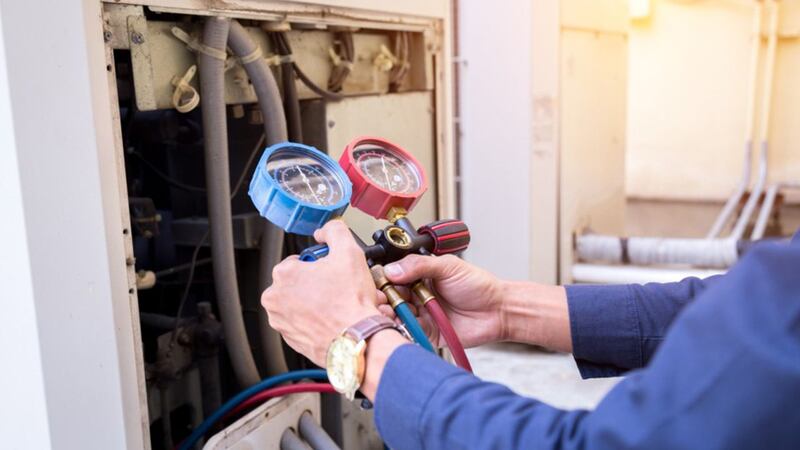ATLANTA — Federal dollars flowing to school districts for COVID-19 precautions mean lots of companies have been peddling products by making big claims.
But a group of scientists are challenging one technology being installed in area schools.
Channel 2 investigative reporter Justin Gray found that metro Atlanta school districts have spent millions installing ionizers in their buildings to clean the air.
Gray spoke with officials from several school districts who said this is a proven technology they trust. But critics question whether the ionizers actually live up to the hype.
Gray was at Lockheed Elementary in Marietta when Bipolar Ionization Systems, or ionizers, were being installed in the newly renovated school’s HVAC systems.
Every Marietta school now has ionizers in the building.
[DOWNLOAD: Free WSB-TV News app for alerts as news breaks]
“A lot of people come out and try to sell a silver bullet for COVID, right? The reality is we’ve been using ionization in our buildings as part of our renovations and new construction for almost a decade,” Chuck Gardner with Marietta City Schools said.
“This is one of our most common devices,” said Sam Kitchens, executive director for capital programs at the Bibb County School District.
In his hand was a small blue device about the size of a book.
Bibb County schools have added ionizers to every school building and more than 100 school buses at a cost of $1.2 million. The devices are meant to help clean the air.
“As the dust collects to them, it makes the dust particles larger, so you can catch them before they go into the air conditioner,” Kitchens said.
The billions of dollars provided by the federal government to help schools fight the virus have led to a boom for ionizers. Companies selling the devices have said they kill the virus.
“When people find out that there’s federal money tied to something, everyone’s pitching something, right?” Gardner said.
Bibb County schools officials said they are relying on data from testing in an independent lab that shows the ionizers kill 99% of the virus.
“Once we found out [from] the laboratory testing that it would kill the virus that was a game changer,” Kitchens said.
But scientists are warning that what sounds like a game change is anything but.
“The problem is that really, you can make anything give you 99.9,” said Dr. Marwa Zaatari, who is an indoor air engineering expert and a member of the Epidemic Task Force for ASHRAE, the professional organization that sets standards for heating, ventilation and air conditioning (HVAC).
MORE CHANNEL 2 INVESTIGATIONS:
- Insider says workers without medical training screen candidates at metro plastic surgery center
- CEO of company behind diet tea claims he had no idea it contained THC
- Federal regulators say Atlanta-based Greensky owes millions to customers
Along with other leading indoor air quality experts, Zaatari sent a letter to school districts encouraging them to disconnect the ionizers. The letter said there is not sufficient evidence they actually work.
“They are not as effective as the manufacturer claims. Some of them they do nothing, like zero,” Zaatari said.
Gray filed open-records act requests with area school districts and found that Gwinnett, Atlanta, Fulton and Marietta City Schools all have installed ionizers in some of their school buildings.
Dekalb County does not use the technology, and Cobb County schools told Gray it can’t answer without doing a full school-by-school inventory.
Zaatari says some studies show ionizers could generate indoor ozone at levels that could endanger children’s lungs.
“If these devices were only ineffective, then you would say, you know, it’s a waste of money. But the problem is that we know that these devices are ineffective, but we also know they might be harmful,” Zaatari said.
Gray asked Kitchens if he was confident it was a safe system that would help keep the building safe.
“Very confident,” Kitchens said.
Bibb County schools said the testing they’ve done in buildings over the summer shows the ionizers do work.
Kitchens said air quality is improved when they are running compared to when they are not.
“There’s more ozone being put out in the public than there is in our buildings right now. So I’m comfortable that’s not an issue,” Kitchens said.
Marietta schools said they had already planned to install ionizers in every school, COVID-19 just sped up the process.
“This is not a magic bullet. It is not a silver bullet. It is part of an overall approach,” Gardner said.
And it’s only one small part of improved HVAC systems. Marietta schools said they rely primarily on increased outdoor air and better air filters.
[SIGN UP: WSB-TV Daily Headlines Newsletter]
“What we did is we just went ahead and accelerated it because we figured if it makes a difference, a little bit of a difference, it’s worth doing. But it was certainly part of a larger kind of multifaceted approach,” Gardner said.
Critics of the ionizers like Zaatari say the money should be spent on basic technology that is known to work, like increasing outside air flow and buying better filters.
Marietta schools said that’s just what they’ve done with their new HVAC systems that the ionizers are part of that system and are needed to help those stronger filters work effectively.
OTHER INVESTIGATIONS:
©2021 Cox Media Group








